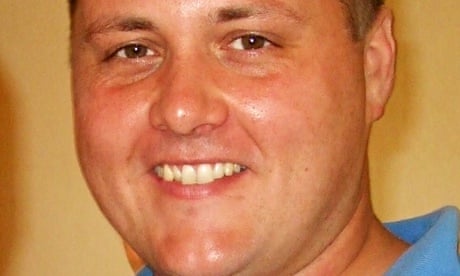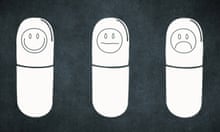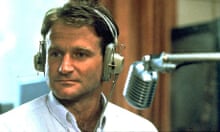On Wednesday morning, on the day of his son's funeral, Adrian Strain awoke to a Radio 4 discussion on mental health that had been prompted by the suicide of Robin Williams.
A young man was describing the utter despair, embarrassment and fear that had led him to a bridge intent on jumping after being diagnosed with schizophrenia and bipolar disorder. Jonny Benjamin, then 20, did not jump because a stranger talked him out of it. Talking, said Benjamin, had saved his life.
Strain listened. "Then I thought, this is exactly what we are going to do.". Talking helped. Debate was vital. So he emailed the Today programme an extract from the eulogy that, a few hours later, was to be read at the funeral of his son, Martin, who took his own life last week after suffering severe depression.
Scores of Martin's friends would hear that eulogy on Wednesday, and share their memories of the "popular, much loved, intelligent, inventive" IT consultant, who laughed a lot at work and was something of a prankster.
It spoke of "the dark cancer that is mental illness" working in the shadows, that no one dare speak of. It spoke of a hope for early intervention in cases of mental illness. It spoke, too, of the bewilderment that Martin's family, his wife Lindsey, his close friends, all felt. They will never know why Martin decided to take his own life or if they could have done more to stop him.
Now, even at this moment of raw grief, his father is determined to keep the debate going.
"Martin was 34. He was married. He had a successful job in IT. When he wasn't ill, he led a full and interesting life," the retired teacher told the Guardian. Seven years ago, he was made redundant, which might have been a trigger for his first serious bout of depression and a previous suicide attempt, he said. But he had found another job. "He has a small house in Leeds. He is married, in a very loving relationship. He has a large extended family around him, all of whom care for him. Friends. Money. On the face of it, everything to live for. And that's the problem. That's the thing. We will never really understand why."
His father believes early intervention is vital. Martin had been off work since April, visiting his GP fortnightly for his repeat prescription of antidepressants. In June, his GP referred him for IAPT – Improving Access to Psychological Therapies. The earliest available appointment was 4 October.
Martin's employers sent their own doctor to assess him. A four-page report said he was highly likely to make a full recovery if he had "dynamic psychotherapy".
"Two weeks ago, I read that out to him and I said: 'Martin, have you read this?' he said 'No, I haven't, really'. Already he had no real enthusiasm to even read properly. And I said 'This is saying you will get better'. We had started to access some lists of therapists that we would use privately … but then he died".
The statistics are alarming, said Strain. "Suicide is a massive killer, an untalked about killer. A total of 5,900 people last year compared with 1,700 deaths on the roads." He believes that is under-reporting, with coroners being conservative in their rulings.
"A huge number are men and, of those men, the vulnerable age group is 20-50." Figures tell us that "young men are very much more likely to commit an aggressive act of self harm against themselves", he said. Some form of intervention could, at least, identify those who will respond to help, he believes.
He would like official guidelines strengthened so that "within four weeks of a young man, aged 20-40, reporting sick for work, reporting to a GP with stress, that there is an immediate referral for a psychiatric assessment".
Too often, people are not taken seriously. "I want people to take mental illness seriously. A young man doesn't just wake up in the morning and think: 'Ah, I'm going to phone in work and tell them I'm mentally ill. You don't do that."
Compared with other illnesses "what we don't know about mental health massively outweighs what we do know", he said. We know the chemical triggers for, say, leukaemia, or, muscular dystrophy, he said. "Not talking about mental ill health, in the same way we would talk about cancer, or blood pressure, is a big problem.
"I am not suggesting that we can have the same quick results that we can with cervical smears. Or putting people on statins, but at least we would make a start in that vulnerable group of people that we know, if they have suicidal feelings, are very likely to act.
"I am not an expert, just Martin's dad," he said.
"For all I know, Martin, like Robin Williams, we may never have been able to help. So my argument is not so personal about Martin. But if there are hundreds and hundreds of younger men trying to kill themselves each year, the very least we should do is try to screen them very, very quickly in case we can help them."
He could get emotive, he said, about the amount of money the NHS spends on many other things compared with mental health. The upshot is: "We are letting young men hurt themselves for want of offering some options for therapy."
Since his death, Martin's family have wondered "what if… ?" he says. They will never know. As his mother, Caroline, said in Wednesday's eulogy: "If Martin had had every support, every clever medicine, every new therapy, he might still have found his life too hard. We will never know and some of us will carry that cross till we die."
To contact Samaritans, call 08457 90 90 90
This article includes content provided by Spotify. We ask for your permission before anything is loaded, as they may be using cookies and other technologies. To view this content, click 'Allow and continue'.
.







Comments (…)
Sign in or create your Guardian account to join the discussion